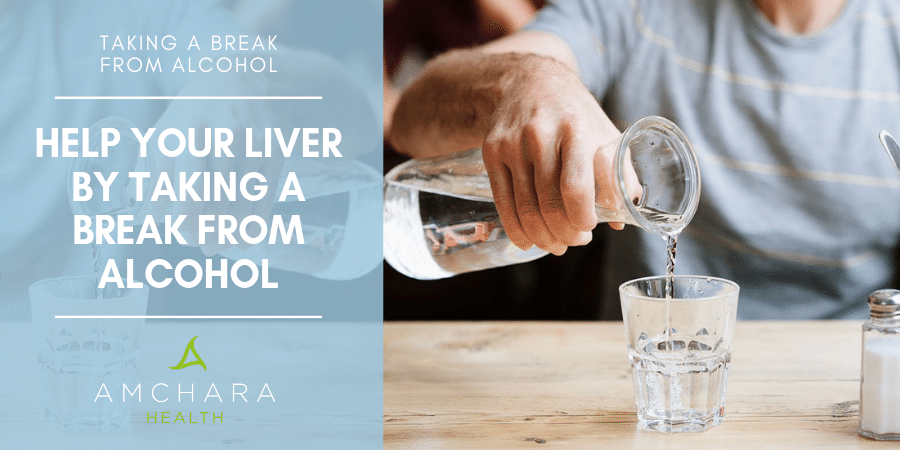The majority of us know that alcohol is the liver’s nemesis, but not necessarily to what extent.
So, why and how can taking a break from alcohol make a difference?
We always take an evidence-based approach – in this article we will examine the effects alcohol has on the liver, symptoms of liver damage and the overall health benefits of giving up alcohol even temporarily.
When was the last time you had an alcohol free day?
It can easily become so much a part of daily routine that you don’t give it a second thought.
The reality is that alcohol has no nutritional value at all, except for some traces of vitamins and minerals which are so minimal they make no significant contribution to your diet.
It was once thought that drinking one or two glasses of red wine every day had nutritional benefits due to the antioxidant content, however new evidence has identified that daily drinking, even at low levels, is detrimental to health. (4)
In fact, alcohol related liver disease is such a problem now that according to national statistics, in 2017 there were over 7,500 alcohol-specific deaths in the UK. (1)
How can you tell if you have alcohol related liver disease?
Many people are unaware of the long term damage they could be inflicting on their liver by drinking alcohol every single day.
What’s more, in many cases individuals that have alcohol related liver disease may not be aware of it as there are typically no noticeable symptoms until the liver is badly damaged. (3)
Early symptoms of alcohol related liver disease are usually quite vague and could be mistaken for other ailments.
You might expect to experience:
- Pain in the abdomen
- Loss of appetite
- Nausea
- Loose stools
- Fatigue
- Generally feeling out of sorts
The symptoms will become much more serious and obvious once damage to the liver progresses and becomes more severe. In these cases the following symptoms (5) may develop:
- Oedema – swelling in the feet, ankles and legs due to fluid build-up
- Ascites – swelling in the abdomen caused by fluid build-up
- Jaundice – causes yellowing of the skin and whites of the eyes
- Personality changes – due to a build-up of toxins in the brain
- Club fingers – where the fingertips and nails are unusually curved
- Increased sensitivity to alcohol and drugs – because the liver cannot detoxify efficiently
- Vomiting blood and passing tarry black stools – as a result of internal bleeding
- Weakness and muscle wasting
- Memory problems and confusion
- Fever and attacks of shivering
- Very itchy skin
- Significant weight loss
- Blotchy red palms
- Hair loss
- Insomnia
- Bleeding
- Nosebleeds
- Bleeding gums
- Tendency to bruise and bleed more easily
The effect alcohol has on the liver
A healthy liver metabolises and filters out harmful toxins in the body.
It also converts vitamins, minerals, nutrients and pharmaceutical drugs into substances that the body can use.
Your liver is also responsible for cleaning your blood, producing bile for digestion and storing glycogen for energy.
Any damage to the liver can seriously affect these processes and can have a significant effect on overall health.
In the past, liver disease was thought to be entirely the result of dietary deficiencies, however the results of numerous clinical studies have now established that alcohol is toxic to the liver.
Even if you have an adequate diet, alcohol can contribute to a whole range of liver diseases, mostly by generating oxidative stress.
The liver can only process so much alcohol at one time – the higher the alcohol content in your blood the more is left circulating in the bloodstream, which starts affecting the heart and brain.
Alcohol in the brain acts as a depressant, slowing down the messaging pathways.
Poor coordination and uninhibited behaviour are usually the first signs of intoxication.
When alcohol reaches the liver it produces a toxic substance called acetaldehyde.
Reactive oxygen species are also generated as a by-product of this process.
Over time these harmful reactions can kill off liver cells and contribute to liver damage resulting in permanent scarring of the liver (cirrhosis), alcoholic hepatitis and may even lead to liver cancer.
Alcohol also interferes with the nutritional process by affecting digestion and the absorption, storage, utilisation and excretion of nutrients.
All of this leads to nutrient depletion and increases the body’s demand for specific nutrients.
As an example, nutrients such as vitamin A, vitamin E and carotenoids that are normally found in the liver are known to be affected by alcohol intake.
It has also been demonstrated that alcohol decreases the intestinal absorption of amino acids and various vitamins such as folate, thiamine and vitamin B12. (7)
Although alcoholic liver damage is caused primarily by alcohol consumption, the resulting nutrient depletions are thought to increase the risk of alcohol related liver damage. (6)
Why having a break from alcohol is a good thing
In general, the amount of alcohol you drink, how often, how much and for how long, determines whether you are at risk of severe liver damage.
Even drinking one or two drinks per day every day of the week can lead to chronic health issues.
Women should be aware that they are more susceptible to liver damage from alcohol than men.
Part of the reason for this may be that women’s digestive systems are less able to process alcohol, which increases the amount of alcohol that reaches the liver.
Overall, women are at risk if they drink about half as much alcohol as men.
Fatty liver disease is the least serious type of liver damage and occurs in over 90% of those who drink too much. (8)
However, the liver is the 2nd largest organ in the body and its cells are capable of regenerating themselves if damaged, providing problems like fatty liver are detected early enough.
Reducing the amount you drink can help to reverse damage of the earlier stages of alcohol related liver disease.
Steps you can take to reduce your risk of liver damage
- Try to go without alcohol on three days of the week to give your liver time to repair itself.
- Keep within the government’s recommended alcohol consumption guidelines and consume no more than 14 units a week.
- As a guide, on average:
- A bottle of wine is 10.1 units
- A pint of beer is 2.3 units
- A large glass of wine is 3 units
- A single shot of spirit is 1 unit
- A bottle of lager is 1.7 units
- If you’re a regular drinker you should try to cut down and spread your drinking evenly over three or more days and avoid binge drinking.
- Make sure you eat a proper meal before drinking. Snacking between drinks can help to slow down the absorption of alcohol.
- Maintain a healthy well balanced diet, as good nutrition helps to support liver function.
- Ensure you are eating enough antioxidants in your diet, which means eating lots of fresh fruit and vegetables. Antioxidants prevent or reduce the oxidative stress that results from the culmination of reactive oxygen species generated by alcohol metabolism.
- Keep an eye on how much you are drinking. MyDrinkaware provides a very useful drink tracking tool, which can help you to cut down. https://www.drinkaware.co.uk/tools/app/
Supplement recommendations
A normal healthy person should derive all the nutrients they need from a well-balanced diet, which should include a rainbow of colourful fruit and vegetables, good quality protein, healthy fats, nuts, seeds and wholegrains.
However as discussed earlier, for someone who drinks a lot, or already has liver damage, there is often a higher demand for nutrients.
In these circumstances, supporting a healthy balanced diet with well absorbed high quality supplements can be beneficial.
- Glutathione (GSH) – a major antioxidant and its depletion plays a key role in alcoholic liver damage, so it makes sense to increase GSH levels in the liver. GSH is synthesised in the body from amino acids that are derived from protein.
- Milk thistle – a popular herb amongst those wishing to support their liver health. The biologically active ingredient in milk thistle is primarily silymarin (70 to 80%). It appears to have antioxidant and toxin-reducing properties in the liver, which have been shown to reduce liver fibrosis and enhance liver regeneration in animal studies. (7)
- B complex vitamins – vitamin deficiencies are common amongst individuals who drink too much alcohol, even where there is no obvious liver disease. B vitamins are of particular concern because deficiencies are common and may also exacerbate the detrimental effects of alcohol.
- S-adenosylmethionine (SAMe) – methionine is an essential amino acid that is metabolised mainly by the liver where a specialised enzyme converts it to S-adenosylmethionine (SAMe). If concentrations of SAMe fall below a certain level or rise too much the normal function of the liver is affected. The activation of methionine to SAMe is impaired by liver disease, so it is an ideal supplement to support liver function and health.
- Multi-vitamin and mineral formula – a good comprehensive formula can help to replenish many of the key vitamins such as vitamins A, C, D and E that are often depleted in those with alcohol related liver disease.
Take home message
Maintaining the right balance of nutrients whilst you are trying to give up alcohol or even just cutting down on your weekly intake can be a struggle, especially if you already have nutrient deficiencies.
It can be really helpful to take guidance from an expert health practitioner who can look closely at your diet and circumstances in order to tailor a liver supportive programme for you.
Why not take advantage of a complimentary consultation with one of Amchara’s health professionals?
Have you found taking a break from alcohol has helped your health?
We’d love to hear from you, please get in touch.
READ THIS NEXT:
- Change Your Relationship With Alcohol
- Liver Friendly Foods to Cleanse Your Liver
- Have you pushed your liver to the limit?
- How Liver Function affects Hormone Balance
- Look After Your Liver And Your Liver Will Look After You
Do you think you have a problem with alcohol? Here are some links that offer help.




